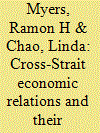| Srl | Item |
| 1 |
ID:
008194


|
|
|
|
|
| Publication |
Dec 1994.
|
| Description |
97-112
|
|
|
|
|
|
|
|
|
|
|
|
|
|
|
|
| 2 |
ID:
061178


|
|
|
|
|
| Publication |
Boulder, Westview Press, 1989.
|
| Description |
ix, 120p.
|
| Series |
Westview special studies on East Asia
|
| Standard Number |
0813308186
|
|
|
|
|
|
|
|
|
|
|
|
Copies: C:1/I:0,R:0,Q:0
Circulation
| Accession# | Call# | Current Location | Status | Policy | Location |
| 031339 | 355.033052/KAT 031339 | Main | On Shelf | General | |
|
|
|
|
| 3 |
ID:
046433


|
|
|
|
|
| Publication |
Lanham, Rowman & Littlefield Pub., 2001.
|
| Description |
vii,314p.
|
| Standard Number |
0742509648
|
|
|
|
|
|
|
|
|
|
|
|
Copies: C:1/I:0,R:0,Q:0
Circulation
| Accession# | Call# | Current Location | Status | Policy | Location |
| 045349 | 327.51073/MYE 045349 | Main | On Shelf | General | |
|
|
|
|
| 4 |
ID:
086301


|
|
|
|
|
| Publication |
2009.
|
| Summary/Abstract |
Primarily relying on the Kuomintang Party archives recently available to scholarship at the Hoover Institution Archives, this article examines the roles of the Kuomintang Central Reform Committee and the party reform under it between 1950 and 1952. The Committee became a crucial contributing factor in terms of the survival of the once defeated and demoralized Kuomintang as a ruling party. While the Kuomintang under the Committee created a variety of direct or indirect controls over the government and society that gave it unquestioned dominance, it also began to interact closely with the people on Taiwan as a result of the party recruitment and the implementation of local-level political reforms, two salient agendas that had never taken place in the mainland. For the sake of revitalizing a party capable of responding to challenges in a new environment, the Kuomintang during its reform period promulgated new rules and regulations, set up new agendas and implement new policies, and instituted various party local branches in different social stratum and vocational categories. These measures, in turn, helped Kuomintang undergo an institutional and cognitional change that was totally unimaginable in the past.
|
|
|
|
|
|
|
|
|
|
|
|
|
|
|
|